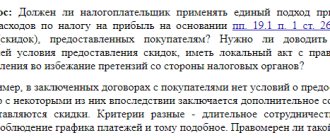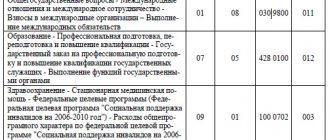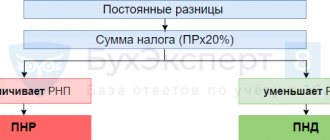To calculate what taxes is Article 250 of the Tax Code of the Russian Federation used?
As non-operating income Art. 250 of the Tax Code of the Russian Federation recognizes such income from the taxpayer’s business activities that are not reflected in Art. 249 Tax Code. As is known, Art. 249 of the Tax Code of the Russian Federation is devoted to income from the sale of goods (products) and the provision of services (work).
The importance of non-operating income in tax accounting is difficult to overestimate, because taxes are withheld from them, just like from proceeds from the sale of goods.
Thus, the formula “income under Art. 249 Tax Code + income under Art. 250 of the Tax Code " is used when calculating the tax base when determining income tax (Articles 247, 248 of the Tax Code of the Russian Federation). This formula is also needed to determine the tax base for the simplified tax system (Article 346.16 of the Tax Code of the Russian Federation) and for the Unified Agricultural Tax (Article 346.5 of the Tax Code of the Russian Federation).
Read about the procedure for accounting for non-operating income under OSNO and simplified tax system in our articles:
- “How to take into account non-operating income when calculating income tax?”;
- “What income is recognized (accounted for) under the simplified tax system?”.
Commentary to Art. 272 Tax Code of the Russian Federation
Expenses using the accrual method are recognized in the reporting (tax) period to which they relate. It does not matter whether these expenses are paid or not. This is stated in Article 272 of the Tax Code of the Russian Federation.
All expenses of the organization are divided into two groups:
— costs associated with production and sales (hereinafter referred to as production costs);
- non-operating expenses.
According to paragraph 2 of Article 272 of the Tax Code of the Russian Federation, an organization recognizes material expenses when:
— raw materials and supplies related to the goods produced (work, services) are transferred to production;
— an act of acceptance and transfer of production works (services) has been signed.
Depreciation is recognized as an expense on a monthly basis. As for a lump sum of 10 percent of the cost of a new fixed asset, as well as 10 percent of expenses for completion, retrofitting, modernization, technical re-equipment and partial liquidation of fixed assets, they are recognized as an expense on the date of depreciation start (the date of change in the original cost).
Expenses for compulsory and voluntary insurance (non-state pension provision) are recognized in the quarter in which they were paid. At the same time, one-time payments under insurance (pension) contracts that are concluded for a period of more than one year are included in expenses evenly over the term of the contract. In this case, such insurance premiums are written off as expenses in proportion to the number of calendar days during which the insurance contract was valid in the reporting period.
Expenses for the acquisition of the leased asset are written off in those reporting periods in which the agreement provides for leasing payments, in proportion to these payments.
As for other production and non-operating expenses, they should be recognized in the manner established by paragraph 7 of Article 272 of the Tax Code of the Russian Federation. The date of these expenses may be, for example:
- for amounts of taxes and fees - the day on which they are accrued;
- for expenses in the form of rental (leasing) payments for rented (leasing) property - the day of settlement or the day when the organization is presented with settlement documents;
- for business trip expenses - the day when the advance report of the posted employee is approved;
— for expenses in the form of interest on loans and borrowings — the day interest is calculated.
For credit and loan agreements concluded for a period of more than one quarter (six months, 9 months or a year), interest for tax purposes is included in expenses at the end of the corresponding reporting period. If, according to the agreement, the borrower pays before the specified period, then - on the date of termination of the agreement (repayment of the debt obligation).
Expenses for the acquisition of the leased asset are written off in those reporting periods in which the agreement provides for leasing payments, in proportion to these payments.
According to paragraph 7 of Article 271 of the Tax Code of the Russian Federation, income on the accrual basis is determined taking into account amount differences. Amount differences arise in cases where payment is made in rubles in an amount equivalent to the amount in foreign currency (conventional monetary units).
What income is usually forgotten to be classified as non-operating income?
Having clarified the enormous importance of non-operating income in determining the base for calculating taxes (after all, if it is underestimated, charges of tax evasion will arise), it is worth considering situations where taxpayers, either out of ignorance or deliberately, overlook certain items of income.
So, income not received from sales includes (Article 250 of the Tax Code of the Russian Federation):
- income related to participation in other organizations (clause 1);
- positive exchange rate difference (items 2, 11);
- fines, penalties and other sanctions (including insurance compensation) awarded or recognized by the debtor, expressed in material form (clause 3);
- income from leasing property (clause 4) and granting rights to use intellectual property (clause 5), if this type of activity is not the main one, taken into account according to the rules of Art. 249 Tax Code of the Russian Federation;
- interest on deposits, loans issued, including on the Central Bank or other promissory notes (clause 6);
- income arising from the restoration of reserve amounts (clause 7);
- the cost (according to market valuation) of property or property rights received free of charge, as well as work or services (clauses 8, 12);
How to determine the amount of income from the gratuitous use of property, see here.
- income arising from participation in a simple partnership (clause 9);
- income from previous years discovered in the current period (clause 10);
- the cost of materials that were obtained during disassembly (dismantling) of assets taken out of use (clause 13);
- contributions and donations used for other than intended purposes, both within the framework of charity and aimed at targeted financing (clauses 14, 15);
- amounts of deposits in the management company that were not returned to participants when capital was reduced (clause 16);
- deposits returned from NPOs (clause 17) or donations (clause 23);
- written off accounts payable (clause 18);
- income from transactions with securities (clause 19);
- surpluses discovered during inventory (clause 20);
- the cost of written-off or returned printed products (clause 21);
- the amount of profit adjustment as a result of applying various calculation methods for tax accounting (clause 22);
- positive difference between deductions and excise taxes (clause 24);
- profit of a controlled foreign organization (clause 25).
Read about the rules that you need to follow when organizing the accounting of income and expenses in the material “The procedure and principles of accounting for income and expenses in an organization.”
Correct accounting of income in tax accounting will help avoid disputes with tax authorities. Find out how recent judicial practice is developing on the application of Art. 250 of the Tax Code of the Russian Federation, from an analytical selection from ConsultantPlus. If you do not have access to the system, get a trial online access to K+ for free.
Article 271. Procedure for recognizing income using the accrual method
Article 271. Procedure for recognizing income using the accrual method
[Tax Code] [Tax Code of the Russian Federation, Part 2] [Section VIII] [Chapter 25]
. For the purposes of this chapter, income is recognized in the reporting (tax) period in which it occurred, regardless of the actual receipt of funds, other property (work, services) and (or) property rights (accrual method), unless otherwise provided by paragraph 1.1 of this article.
1.1. Taxpayers specified in subparagraph 1 of paragraph 1 of Article 275.2 of this Code recognize income from activities related to the production of hydrocarbons in a new offshore hydrocarbon field in the tax (reporting) period in which they occurred, regardless of the time of actual receipt cash, other property (work, services) and (or) property rights (accrual method), but not earlier than the date of allocation of a new offshore hydrocarbon deposit on the subsoil plot or in the cases provided for in paragraph 8 of Article 261 of this Code, the date of the taxpayer’s decision on the completion of work (part of it) for the development of natural resources on a specified subsoil plot or on the complete cessation of work on a subsoil plot due to economic infeasibility, geological futility or for other reasons.
If more than one new offshore hydrocarbon deposit is allocated on a subsoil plot, the amount of income up to the date of allocation of new offshore hydrocarbon deposits on a subsoil plot related to activities related to the production of hydrocarbon raw materials at a new offshore hydrocarbon deposit carried out at each new deposit on this subsoil plot is determined taking into account the provisions of paragraph 3 of Article 299.3 of this Code.
The income specified in this paragraph, expressed in foreign currency, for tax purposes is recalculated into rubles at the official rate established by the Central Bank of the Russian Federation on the dates corresponding to the dates of recognition of similar types of income in accordance with paragraphs 3 - 6 of this article, without taking into account the provisions of paragraph one of this paragraph.
. For income relating to several reporting (tax) periods, and if the relationship between income and expenses cannot be clearly defined or is determined indirectly, income is distributed by the taxpayer independently, taking into account the principle of uniform recognition of income and expenses.
For industries with a long (more than one tax period) technological cycle, if the terms of the concluded contracts do not provide for stage-by-stage delivery of work (services), income from the sale of the specified work (services) is distributed by the taxpayer independently in accordance with the principle of formation of expenses for the specified work (services) ).
. For income from sales, unless otherwise provided by this chapter, the date of receipt of income is the date of sale of goods (works, services, property rights), determined in accordance with paragraph 1 of Article 39 of this Code, regardless of the actual receipt of funds (other property (works) , services) and (or) property rights) in payment for them. When selling goods (work, services) under a commission agreement (agency agreement) by the taxpayer-committent (principal), the date of receipt of income from the sale is the date of sale of the property (property rights) belonging to the committent (principal), indicated in the notice of the commission agent (agent) about the sale and (or) in the report of the commission agent (agent).
The date of sale of real estate is the date of transfer of real estate to the acquirer of this property under a transfer deed or other document on the transfer of real estate.
The date of sale of securities owned by the taxpayer is also recognized as:
- date of termination of obligations to transfer securities by offsetting similar counterclaims;
- the date of actual receipt by the taxpayer of the amounts of partial repayment of the nominal value of the security during the period of its circulation, provided for by the terms of issue.
For the purposes of this chapter, requirements for the transfer of securities of the same issuer, one type, one category (type) or one mutual investment fund (for investment units of mutual investment funds) with the same volume of rights are recognized as homogeneous.
In this case, the offset of counter homogeneous claims must be confirmed by documents in accordance with the legislation of the Russian Federation on the termination of obligations to transfer (accept) securities, including reports of the clearing organization, persons engaged in brokerage activities, or managers who, in accordance with the legislation of the Russian Federation, provide clearing, brokerage services or carry out trust management in the interests of the taxpayer.
. For non-operating income, the date of receipt of income is recognized as:
- 1) the date of signing by the parties of the act of acceptance and transfer of property (acceptance and delivery of work, services) - for income:
- paragraph excluded. — Federal Law of May 29, 2002 N 57-FZ;
- in the form of property (work, services) received free of charge;
- for other similar income;
- in the form of dividends from equity participation in the activities of other organizations;
- in the form of gratuitously received funds;
- in the form of refunds of contributions previously paid to non-profit organizations that were included in expenses;
- in the form of interest accrued on the amount of claims of the bankruptcy creditor in accordance with the legislation on insolvency (bankruptcy);
- in the form of other similar income;
- from leasing property;
- in the form of license payments (including royalties) for the use of intellectual property;
- in the form of other similar income;
- in the form of amounts of restored reserves and other similar income;
- in the form of income distributed in favor of the taxpayer with his participation in a simple partnership;
- on income from trust management of property;
- for other similar income;
4.1. Funds in the form of subsidies, with the exception of those specified in Article 251 of this Code or received within the framework of a remunerative agreement, are recognized as part of non-operating income in the following order:
- subsidies received to finance expenses not related to the acquisition, creation, reconstruction, modernization, technical re-equipment of depreciable property, acquisition of property rights, are taken into account as expenses actually incurred from these funds are recognized;
- subsidies received to finance expenses associated with the acquisition, creation, reconstruction, modernization, technical re-equipment of depreciable property, acquisition of property rights are taken into account as expenses actually incurred using these funds are recognized. When selling, liquidating or otherwise disposing of the specified property, property rights, subsidies received that are not included in income are recognized as non-operating income on the last date of the reporting (tax) period in which the sale, liquidation or other disposal of the specified property, property rights took place;
- subsidies received to compensate for previously incurred expenses not related to the acquisition, creation, reconstruction, modernization, technical re-equipment of depreciable property, acquisition of property rights, or lost income are taken into account at a time on the date of their enrollment;
- subsidies received to compensate for previously incurred expenses related to the acquisition, creation, reconstruction, modernization, technical re-equipment of depreciable property, acquisition of property rights, are taken into account at a time on the date of their enrollment in the amount corresponding to the amount of accrued depreciation for previously incurred expenses related to the acquisition, creation, reconstruction, modernization, technical re-equipment of depreciable property, acquisition of property rights. The difference between the amount of subsidies received and the amount included in income on the date of their crediting is reflected in income in a manner similar to the procedure provided for in paragraph three of this paragraph.
In case of violation of the conditions for receiving subsidies provided for in this paragraph, the amounts of subsidies received are reflected in full as part of the income of the tax period in which the violation was committed.
Funds received from the grantor under a concession agreement, as well as funds received from a public partner under a public-private partnership agreement, municipal-private partnership agreement, are recognized in the manner prescribed by this paragraph for accounting for subsidies.
4.2 - 4.4. No longer in force on January 1, 2015. — Federal Law of December 29, 2014 N 465-FZ.
. When a financial agent sells financing services against the assignment of a monetary claim, as well as sells financial services to a new creditor who has received the specified claim, the date of receipt of income is determined as the day of the subsequent assignment of this claim or the debtor’s fulfillment of this claim. When a taxpayer - seller of goods (works, services) assigns the right to claim a debt to a third party, the date of receipt of the assignment of the right of claim is determined as the day the parties sign the act of assignment of the right of claim.
. Under loan agreements or other similar agreements (including debt obligations issued by securities), the validity of which falls on more than one reporting (tax) period, for the purposes of this chapter, income is recognized as received and is included in the relevant income at the end of each month of the corresponding reporting period. (tax) period, regardless of the date (terms) of its payment stipulated by the agreement, with the exception of the income specified in subparagraph 14 of paragraph 4 of this article.
If a loan agreement or other similar agreement (including debt obligations issued by securities) stipulates that the fulfillment of an obligation under such an agreement depends on the value (or other value) of the underlying asset with the accrual of a fixed interest rate during the validity period of the agreement, income accrued based on this fixed rate, are recognized on the last day of each month of the corresponding reporting (tax) period, and income actually received based on the current value (or other value) of the underlying asset is recognized on the date of fulfillment of the obligation under this agreement.
In the event of termination of the agreement (repayment of a debt obligation) during a calendar month, income is recognized as received and is included in the relevant income on the date of termination of the agreement (repayment of a debt obligation).
The provisions of this paragraph do not apply to income in the form of interest accrued on the amount of claims of the bankruptcy creditor in accordance with the legislation on insolvency (bankruptcy).
Regardless of the provisions of paragraphs one through three of this paragraph, income in the form of interest accrued under a loan agreement to finance a foreign geological exploration project and not recognized for tax purposes for the period from the date of issuance of such a loan to the last day of the month on which the date of the decision on such foreign geological exploration project are taken into account for tax purposes in one of the following ways:
- in the event of termination of obligations under a loan agreement to finance a foreign geological exploration project in full without satisfying the property claims of the taxpayer in connection with the completion of work on the specified foreign geological exploration project and recognition of such a project as economically inexpedient and (or) geologically unpromising, they are not taken into account for the purposes of taxation;
- in the event that a loan agreement for financing a foreign geological exploration project does not comply with one of the conditions specified in paragraph 11 of Article 261 of this Code, it is taken into account in full on the 1st day of the month following the month in which such a condition was violated;
- in other cases, they are taken into account evenly over two years, starting from the month following the month in which the decision was made on a foreign geological exploration project.
The date of decision-making on a foreign geological exploration project is recognized as the earliest of the following dates:
- the date the taxpayer made a decision on the success of the foreign geological exploration project;
- the date of termination of obligations under a loan agreement to finance a foreign geological exploration project in full without satisfying the property claims of the taxpayer in connection with the completion of work on the specified foreign geological exploration project and the recognition of such a project as economically infeasible and (or) geologically unpromising;
- date of termination (partial termination) of obligations under a loan agreement to finance a foreign geological exploration project;
- the date on which one of the conditions specified in paragraph 11 of Article 261 of this Code was violated in relation to the loan agreement for financing a foreign geological exploration project;
- the last day of the month in which seven consecutive calendar years expire from the date of issuance of a loan to finance a foreign geological exploration project.
The recognition of a foreign geological exploration project as successful or economically inexpedient and (or) geologically unpromising is carried out by the taxpayer independently in a manner similar to the procedure established by paragraph 10 of Article 261 of this Code in relation to the decision specified in paragraph five of paragraph 11 of Article 261 of this Code.
Income in the form of interest actually received (both in cash and in kind, including by offsetting counterclaims and obligations) by the taxpayer under a loan agreement to finance a foreign geological exploration project in the period from the date of issuance of such a loan to the last day of the month , on which the date of decision-making on such a foreign geological exploration project falls, are recognized on the date of their receipt, determined in the manner established by paragraph 2 of Article 273 of this Code.
. Lost power. — Federal Law of April 20, 2014 N 81-FZ.
. Income expressed in foreign currency is recalculated for tax purposes into rubles at the official rate established by the Central Bank of the Russian Federation on the date of recognition of the relevant income, unless otherwise established by this paragraph.
Claims (obligations), the value of which is expressed in foreign currency, property in the form of currency values are converted into rubles at the official rate established by the Central Bank of the Russian Federation on the date of transfer of ownership of the specified property, termination (fulfillment) of claims (obligations) and (or) on the last day of the current month, depending on what happened earlier.
If, when recalculating the value of claims (obligations) expressed in foreign currency (conventional monetary units) payable in rubles, a different foreign exchange rate is applied, established by law or by agreement of the parties, the recalculation of income, claims (obligations) in accordance with this paragraph is carried out according to this course.
In the case of receiving an advance or deposit, income expressed in foreign currency is recalculated into rubles at the official rate established by the Central Bank of the Russian Federation on the date of receipt of the advance or deposit (in the part attributable to the advance or deposit).
Claims, the value of which is expressed in foreign currency, under a loan agreement to finance a foreign geological exploration project (including arrears on accrued interest) are converted into rubles at the official rate established by the Central Bank of the Russian Federation on the date of the decision on the foreign geological exploration project, determined in the manner established by paragraph 6 of this article.
Income in the form of a positive exchange rate difference arising as a result of the recalculation of claims under a loan agreement to finance a foreign geological exploration project on the date of the decision on the foreign geological exploration project is recognized as part of non-operating income in one of the following ways:
- in the event of termination of obligations under such a loan agreement in full without satisfaction of the property claims of the taxpayer in connection with the completion of work on the specified foreign geological exploration project and recognition of such a project as economically inexpedient and (or) geologically unpromising, they are not taken into account for tax purposes;
- in the event that a loan agreement for financing a foreign geological exploration project does not comply with one of the conditions specified in paragraph 11 of Article 261 of this Code, it is taken into account in full on the date when such a condition was violated;
- in other cases, they are taken into account evenly over two years, starting from the month following the month in which the decision was made on a foreign geological exploration project.
Starting from the day following the date of the decision on a foreign geological exploration project, the recalculation of claims, the value of which is expressed in foreign currency, under the corresponding loan agreement for financing a foreign geological exploration project into rubles is carried out in the general manner established by paragraphs one through four of this point.
Features in the date of recognition of income under Art. 250 Tax Code of the Russian Federation
Also, many difficulties arise from questions regarding the date of recognition of non-operating income. It is especially important to have a clear position on this issue when checking the correctness of tax assessments by fiscal inspectors.
Let's look at a few common cases that can cause difficulties for taxpayers.
So, the amount of insurance compensation should be taken into account as part of gross income as of the date:
- making such a positive decision by the insurer if the taxpayer uses the accrual method in accordance with subparagraph. 4 p. 4 art. 271 Tax Code of the Russian Federation;
- receiving funds from the insurer using the cash method in accordance with clause 2 of Art. 273 Tax Code of the Russian Federation.
A taxpayer using the accrual method when calculating income tax includes as income the amount of rent from leasing out its assets on the last day for reporting (usually this day is specified in the agreement, and it may be the last day of each calendar month) - according to subclause. 3 p. 4 art. 271 Tax Code of the Russian Federation. If the taxpayer considers income taxable as profit using the cash method, then the date of accounting for rent as part of non-operating income is the moment of actual receipt of funds (clause 2 of Article 273 of the Tax Code of the Russian Federation).
You can learn about the fundamental differences in these methods from our article “Accrual method and cash method: main differences” .
Important! At the same time, there is some conflict as to whether rent is included in non-operating income or whether it should be classified as income from the provision of services. Thus, based on the norms of the Tax Code and armed with the explanations of the financial department set out in the letter of the Ministry of Finance dated 02/07/2011 No. 03-03-06/1/74, it is possible to classify rent as income from sales (Article 249 of the Tax Code of the Russian Federation) only in that case if the taxpayer provides such services systematically, and they are the main ones among the company’s activities listed in the Unified State Register of Legal Entities (or for individual entrepreneurs in the Unified State Register of Individual Entrepreneurs).
UrDela.ru
On the refusal to accept for consideration a request to recognize paragraph 1 of Article 271 as inconsistent with the Constitution of the Russian Federation, see the ruling of the Constitutional Court of the Russian Federation dated 06.06.2003 N 278-O.
Part 1. For the purposes of this chapter, income is recognized in the reporting (tax) period in which it occurred, regardless of the actual receipt of funds, other property (work, services) and (or) property rights (accrual method).
Part 2. For income relating to several reporting (tax) periods, and if the relationship between income and expenses cannot be clearly defined or is determined indirectly, income is distributed by the taxpayer independently, taking into account the principle of uniform recognition of income and expenses.
For industries with a long (more than one tax period) technological cycle, if the terms of the concluded contracts do not provide for stage-by-stage delivery of work (services), income from the sale of the specified work (services) is distributed by the taxpayer independently in accordance with the principle of formation of expenses for the specified work (services) ).
On the refusal to accept for consideration a request to recognize paragraph 3 of Article 271 as inconsistent with the Constitution of the Russian Federation, see the ruling of the Constitutional Court of the Russian Federation dated 06.06.2003 N 278-O.
Part 3. For income from sales, unless otherwise provided by this chapter, the date of receipt of income is the date of sale of goods.
The date of sale of securities owned by the taxpayer is also recognized as the date of termination of obligations to transfer securities by offsetting similar counterclaims.
For the purposes of this chapter, requirements for the transfer of securities of the same issuer, one type, one category (type) or one mutual investment fund (for investment units of mutual investment funds) with the same volume of rights are recognized as homogeneous.
In this case, the offset of counter homogeneous claims must be confirmed by documents in accordance with the legislation of the Russian Federation on the termination of obligations to transfer (accept) securities, including reports of the clearing organization, persons engaged in brokerage activities, or managers who, in accordance with the legislation of the Russian Federation, provide clearing, brokerage services or carry out trust management in the interests of the taxpayer.
Part 4. For non-operating income, the date of receipt of income is recognized as:
1) date of signing by the parties of the property acceptance certificate (acceptance and delivery of work, services) - for income:
paragraph excluded. — Federal Law of May 29, 2002 N 57-FZ; in the form of property (work, services) received free of charge; for other similar income;
2) date of receipt of funds to the taxpayer’s current account (cash) - for income:
in the form of dividends from equity participation in the activities of other organizations; in the form of gratuitously received funds; in the form of refunds of contributions previously paid to non-profit organizations that were included in expenses; in the form of other similar income;
On the refusal to accept for consideration a request to recognize subparagraph 3 of paragraph 4 of Article 271 as inconsistent with the Constitution of the Russian Federation, see the ruling of the Constitutional Court of the Russian Federation dated 06.06.2003 N 278-O.
3) the date of making payments in accordance with the terms of concluded agreements or presenting to the taxpayer documents serving as the basis for making calculations, or the last day of the reporting (tax) period - for income:
from leasing property; in the form of license payments (including royalties) for the use of intellectual property; in the form of other similar income;
On the refusal to accept for consideration a request to recognize subparagraph 4 of paragraph 4 of Article 271 as inconsistent with the Constitution of the Russian Federation, see the ruling of the Constitutional Court of the Russian Federation dated 06.06.2003 N 278-O.
4) the date of recognition by the debtor or the date of entry into legal force of the court decision - for income in the form of fines, penalties and (or) other sanctions for violation of contractual or debt obligations, as well as in the form of amounts of compensation for losses (damage);
On the refusal to accept for consideration a request to recognize subparagraph 5 of paragraph 4 of Article 271 as inconsistent with the Constitution of the Russian Federation, see the ruling of the Constitutional Court of the Russian Federation dated 06.06.2003 N 278-O.
5) last day of the reporting (tax) period - for income:
in the form of amounts of restored reserves and other similar income; in the form of income distributed in favor of the taxpayer with his participation in a simple partnership; on income from trust management of property; for other similar income;
6) date of identification of income (reception and (or) discovery of documents confirming the existence of income) - for income of previous years;
7) the date of transfer of ownership of foreign currency and precious metals when carrying out transactions with foreign currency and precious metals, as well as the last day of the current month - for income in the form of a positive exchange rate difference on property and claims (liabilities), the value of which is expressed in foreign currency, and positive revaluation of the value of precious metals;
7) excluded. — Federal Law of May 29, 2002 N 57-FZ;
the date of drawing up the act of liquidation of depreciable property, drawn up in accordance with accounting requirements - for income in the form of materials received or other property during the liquidation of depreciable property being taken out of service;
9) the date when the recipient of the property (including funds) actually used the specified property (including funds) for other than its intended purpose or violated the conditions under which they were provided - for income in the form of property (including funds), specified in paragraphs 14, 15 of Article 250 of this Code;
10) the date of transfer of ownership of foreign currency for income from the sale (purchase) of foreign currency.
Part 5. When a financial agent sells financing services against the assignment of a monetary claim, as well as sells financial services to a new creditor who has received the specified claim, the date of receipt of income is determined as the day of the subsequent assignment of this claim or the debtor’s fulfillment of this claim. When a taxpayer - seller of goods (works, services) assigns the right to claim a debt to a third party, the date of receipt of the assignment of the right of claim is determined as the day the parties sign the act of assignment of the right of claim.
Part 6. For loan agreements and other similar agreements (other debt obligations, including securities), the validity of which falls on more than one reporting period, for the purposes of this chapter, income is recognized as received and is included in the corresponding income at the end of the month of the corresponding reporting period period.
In the event of termination of the agreement (repayment of the debt obligation) before the expiration of the reporting period, income is recognized as received and is included in the relevant income on the date of termination of the agreement (repayment of the debt obligation).
Part 7. The amount difference is recognized as income:
1) for the taxpayer-seller - on the date of repayment of receivables for sold goods (work, services), property rights, and in the case of advance payment - on the date of sale of goods (work, services), property rights;
2) for the taxpayer-buyer - on the date of repayment of accounts payable for purchased goods (work, services), property, property or other rights, and in the case of advance payment - on the date of acquisition of goods (work, services), property, property or other rights.
Part 8. Income expressed in foreign currency is recalculated for tax purposes into rubles at the official rate established by the Central Bank of the Russian Federation on the date of recognition of the relevant income.
Obligations and claims expressed in foreign currency, property in the form of currency values are recalculated into rubles at the official rate established by the Central Bank of the Russian Federation on the date of transfer of ownership of transactions with the specified property, termination (fulfillment) of obligations and claims and (or) on the last the number of the reporting (tax) period, depending on what happened earlier. ‹ Article 270 (Tax Code of the Russian Federation). Expenses not taken into account for tax purposes Up Article 272 (Tax Code of the Russian Federation). Procedure for recognizing expenses using the accrual method ›







